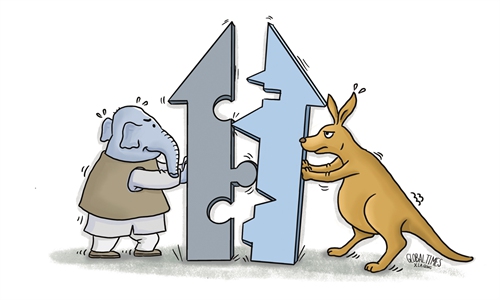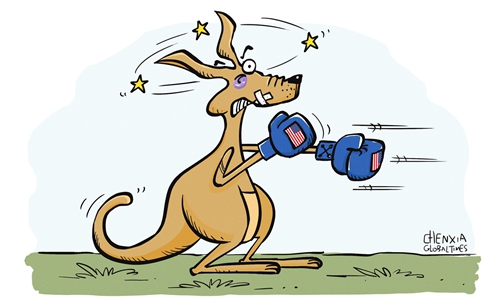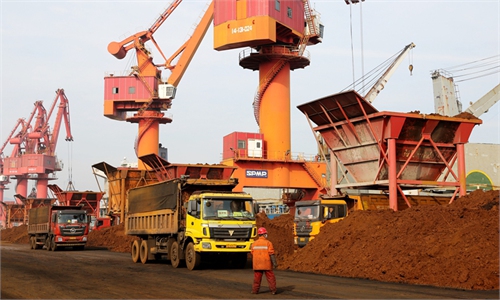
The photo taken on June 23, 2020 shows the logo of Australian Strategic Policy Institute in an office building, in Canberra, Australia. Photo: Xinhua
The Australian Strategic Policy Institute (ASPI), a think tank reliant on US defense money that is keen to concoct and hype various anti-China topics, claimed in a study published on Wednesday that Australia is the top target of China's "economic and diplomatic coercion."
At a time when China-Australia economic and trade cooperation is showing a positive momentum thanks to the efforts of both sides, the ASPI hit piece once again attempts to demonize China, Australia's number one export market, through touting an absurd cliché that goes against the facts.
Considering that this so-called academic institution has long been exposed as being run on US grants and donations, ASPI's repeated attacks against China are not surprising, but it must be pointed out that such malicious lies under the guise of "academic study" are the real top threat to the recovery of mutually beneficial economic and trade ties between China and Australia and Australia's economic security.
In the so-called study, ASPI recommended Canberra form a coalition of like-minded states to establish an international taskforce on countering "coercion." The blatant instigation of economic "decoupling" from China with Cold War mentality and ideological bias is nothing but political interference in normal economic and trade cooperation. This kind of advice is clearly harmful to the Australian economy that is flirting with recession.
Over the past few years, it was precisely under the influence of these damaging suggestions that the Morrison government made wrong decisions on China economic and trade policy, which severely damaged the China-Australia economic and trade cooperation, harming Australian businesses.
But even so, the biggest reality of China-Australia trade has not changed: China is still Australia's largest trading partner, and the bilateral trade volume between the two countries exceeds the sum of trade between Australia and its second, third, and fourth trading partners. As long as no additional political interference and disruption is imposed, this pair of mutually beneficial and complementary economic and trade relations will surely play a key role in Australia's economic rebound this year.
At present, China-Australia economic and trade relations recovery is showing positive momentum, ASPI's latest round of attacks is obviously outdated and needs to be shelved, as it has been proved that the Australian economy is inseparable from the Chinese market. Australian companies that have gained real benefits in the Chinese market for a long time know that ASPI's "coercion" hype is completely nonsense.
In November 2022, the leaders of China and Australia held a positive and constructive meeting in Bali, Indonesia, charting the course and making strategic guidance for the improvement of bilateral relations. On February 6, Chinese Commerce Minister Wang Wentao held a video meeting with Australian Trade Minister Don Farrell, which is widely regarded as an important step for China-Australia economic and trade relations to get back on track.
On February 22, the Australian East Asia Forum website published an article titled "Australian reliance on Chinese exports an economic reality" by James Laurenceson, professor and director at the Australia-China Relations Institute at the University of Technology Sydney. The article wrote global markets may well redirect Australian exports back to China and coal trade between Australia and China already resumed in January 2023.
China-Australia economic and trade cooperation should not be affected by external factors, let alone become a victim of other countries' geopolitical games. Strengthening economic and trade cooperation between the two sides is beneficial to the economies of both countries. At the critical juncture of economic recovery, it is believed that the Australian government will cherish the hard-won momentum of warming up, respect the basic facts, continue to meet China halfway, and restore bilateral economic and trade relations.
The author is a reporter with the Global Times. bizopinion@globaltimes.com.cn



